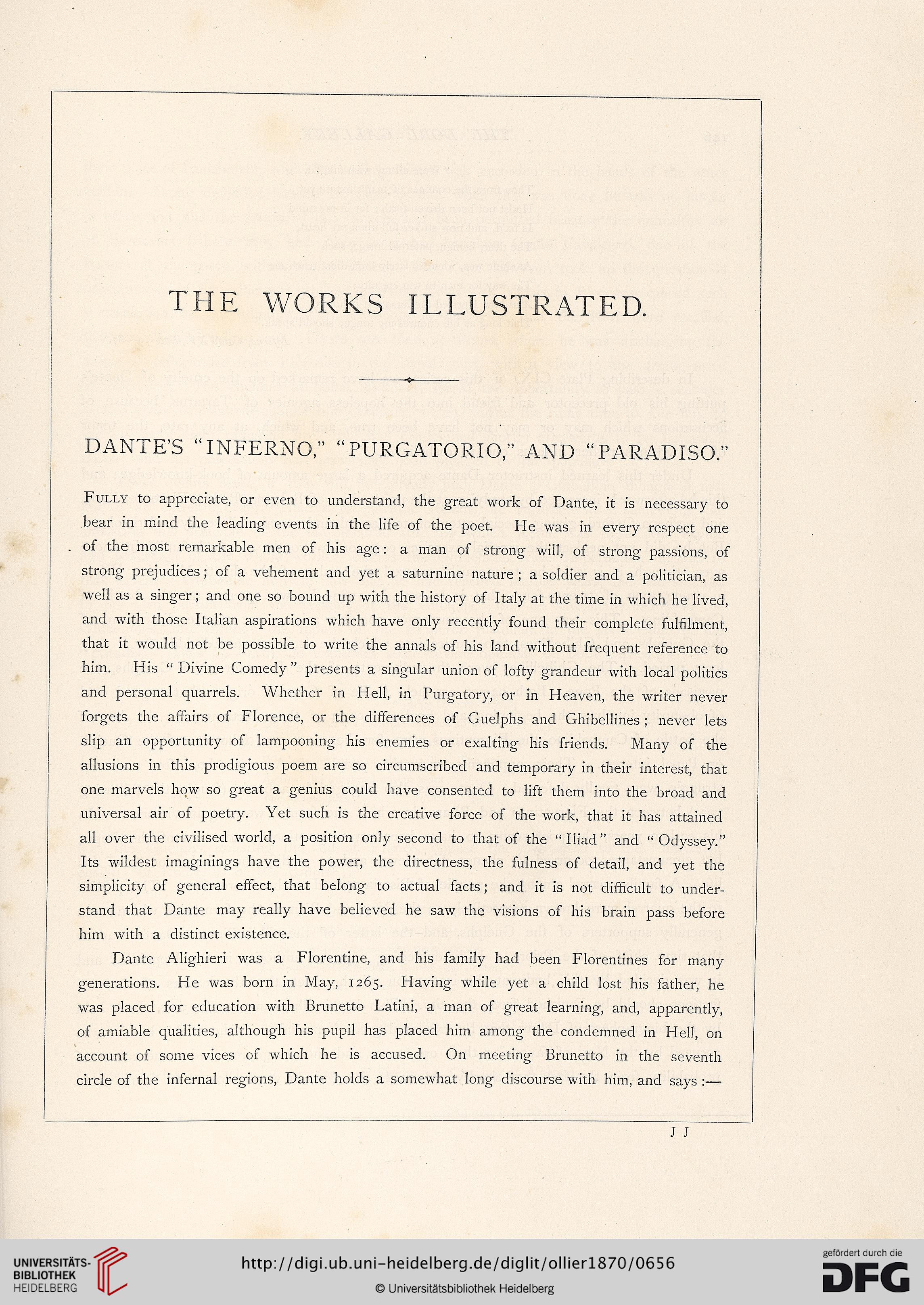THE WORKS ILLUSTRATED.
DANTE’S “INFERNO,” “PURGATORIO,” AND “PARADISO.”
Fully to appreciate, or even to understand, the great work of Dante, it is necessary to
bear in mind the leading events in the life of the poet. hie was in every respect one
of the most remarkable men of his age: a man of strong will, of strong passions, of
strong prejudices; of a vehement and yet a saturnine nature; a soldier and a politician, as
well as a singer; and one so bound up with the history of Italy at the time in which he lived,
and with those Italian aspirations which have only recently found their complete fulfilment,
that it would not be possible to write the annals of his land without frequent reference to
him. His “ Divine Comedy” presents a singular union of lofty grandeur with local politics
and personal quarrels. Whether in Hell, in Purgatory, or in Heaven, the writer never
forgets the affairs of Florence, or the differences of Guelphs and Ghibellines ; never lets
slip an opportunity of lampooning his enemies or exalting his friends. Many of the
allusions in this prodigious poem are so circumscribed and temporary in their interest, that
one marvels how so great a genius could have consented to lift them into the broad and
universal air of poetry. Yet such is the creative force of the work, that it has attained
all over the civilised world, a position only second to that of the “Iliad” and “Odyssey.”
Its wildest imaginings have the power, the directness, the fulness of detail, and yet the
simplicity of general effect, that belong to actual facts; and it is not difficult to under-
stand that Dante may really have believed he saw the visions of his brain pass before
him with a distinct existence.
Dante Alighieri was a Florentine, and his family had been Florentines for many
generations. He was born in May, 1265. Having while yet a child lost his father, he
was placed for education with Brunetto Latini, a man of great learning, and, apparently,
of amiable qualities, although his pupil has placed him among the condemned in Hell, on
account of some vices of which he is accused. On meeting Brunetto in the seventh
circle of the infernal regions, Dante holds a somewhat long discourse with him, and says :—
DANTE’S “INFERNO,” “PURGATORIO,” AND “PARADISO.”
Fully to appreciate, or even to understand, the great work of Dante, it is necessary to
bear in mind the leading events in the life of the poet. hie was in every respect one
of the most remarkable men of his age: a man of strong will, of strong passions, of
strong prejudices; of a vehement and yet a saturnine nature; a soldier and a politician, as
well as a singer; and one so bound up with the history of Italy at the time in which he lived,
and with those Italian aspirations which have only recently found their complete fulfilment,
that it would not be possible to write the annals of his land without frequent reference to
him. His “ Divine Comedy” presents a singular union of lofty grandeur with local politics
and personal quarrels. Whether in Hell, in Purgatory, or in Heaven, the writer never
forgets the affairs of Florence, or the differences of Guelphs and Ghibellines ; never lets
slip an opportunity of lampooning his enemies or exalting his friends. Many of the
allusions in this prodigious poem are so circumscribed and temporary in their interest, that
one marvels how so great a genius could have consented to lift them into the broad and
universal air of poetry. Yet such is the creative force of the work, that it has attained
all over the civilised world, a position only second to that of the “Iliad” and “Odyssey.”
Its wildest imaginings have the power, the directness, the fulness of detail, and yet the
simplicity of general effect, that belong to actual facts; and it is not difficult to under-
stand that Dante may really have believed he saw the visions of his brain pass before
him with a distinct existence.
Dante Alighieri was a Florentine, and his family had been Florentines for many
generations. He was born in May, 1265. Having while yet a child lost his father, he
was placed for education with Brunetto Latini, a man of great learning, and, apparently,
of amiable qualities, although his pupil has placed him among the condemned in Hell, on
account of some vices of which he is accused. On meeting Brunetto in the seventh
circle of the infernal regions, Dante holds a somewhat long discourse with him, and says :—




